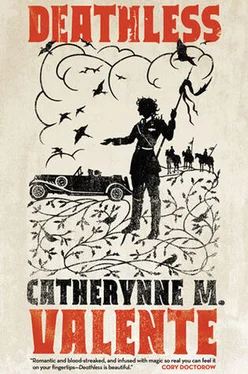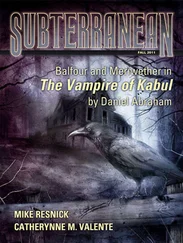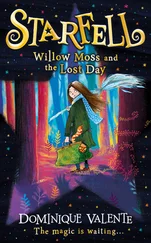Catherynne Valente
Deathless
For Dmitri,
who spirited me away from a dark place
From the year nineteen forty
I look out on everything as if from a high tower
As if bidding farewell
To that from which I long ago parted.
As if crossing myself
And descending beneath dark arches.
—ANNA AKHMATOVA
PROLOGUE
Don’t Look Behind You
Woodsmoke hung heavy and golden on the shorn wheat, the earth bristling like an old, bald woman. The apple trees had long ago been stripped for kindling; the cherry roots long since dug up and boiled into meal. The sky sagged cold and wan, coughing spatters of phlegmatic sunlight onto the grey and empty farms. The birds had gone, arrows flung forth in invisible skirmishes, always south, always away. Yet three skinny, molting creatures clapped a withered pear branch in their claws, peering down with eyes like rosary beads: a gold-speckled plover, a sharp-billed shrike, and a bony, black-faced rook clutched the greenbark trunk. A wind picked up; it smelled of clover growing through the roof, rust, and old, dry marrow.
The boy stood sniffling, snot and tears dripping down his chin. He tried to knuckle it away, rubbing his nose red and scratching his belly with the other scuffed-up hand. His hair was colorless, his age vague, though no fuzz showed on his face, no squareness set his jaw, and his ribs would have been narrow even if they had meat on them. His eyes drooped, too tired to squint in the autumnal light. The sun slashed through his pupils, stirring shadows there.
“Comrade Tkachuk!” A young woman’s voice cut through the brisk, ashy wind like scissors. “You have been accused of desertion, gross cowardice in the face of the enemy. Do you deny this?”
The boy stared at the pair of officers and their polished tribunal bench, dragged from a truck into this wasted field for the purpose of punishing him, as though the army were a terrible stern mother, and he a child who had not come to dinner when called. His nose dribbled.
“On the eighteenth of June,” continued the staff sergeant, her pen scratching against her notepad like a bird in the dust, “did you report for service when Lieutenant-General Tereshenko opened his books to the village of Mikhaylovka so that all might know glory on earth through the gift of their bodies to the People?”
“N-no…” mumbled the boy, his voice thick and slurred, an illiterate voice, a field hand’s lazy vowels. The officer’s nose wrinkled in distaste.
“Why not?” she barked, the buttons on her olive uniform blinking like eyes in the sun.
“I … I’m … eleven, ma’am.” The sergeant frowned, but did not open her arms to him, did not gather him up or smooth his hair or feed him bread. He hurried on. “And I got this bad leg. Broke when I were six. I … I falled out a cherry tree. The man come with his big book, and I run and hidded with the pigs. Don’t want t’be in the army. Wouldn’t be no good soldier anyhow.”
The staff sergeant’s gaze sharpened itself on the boy’s fumbling speech. “The service of your body is not yours to give as you please. It belongs to the People, and you have stolen from us by means of your weakness. However, the People are not unkind. Just as you chose to hide among pigs rather than serve among lions, you may now choose your reprimand: execution by firing squad, which is no more than you deserve, or service in a penalty battalion.”
The boy stared, his eyes glassy and mute.
“That will be the front lines, son,” said the senior officer, her rough voice honey-full of infinite mercy. The rook ruffled her feathers; the shrike clacked her beak. The plover called, mournful and high. A wind kicked at the grasses, then, sudden and brief, neither warm nor sweet. The senior officer’s thick, dark hair was plaited around her head like a corona, her stare hard and tired. “You probably won’t survive. But you might. You’re small; we all were, once. You could be missed in the ranks. It has been known to happen.”
The staff sergeant looked bored. She made a note on her pad. “Comrade Tkachuk, what is it you want?”
The boy said nothing for a moment, his gaze moving between the two officers, seeking mercy like a boar snuffling for mushrooms in the loam. Finding nothing, he simply started to cry: thin, dry, starved tears cutting through the dirt on his face. His little chest heaved jerkily; his shoulders shook as though snow was already falling. He rubbed his nose furiously on a bare arm. Blood showed pinkish in the mucus.
“I want t’go home, ” he sobbed.
The plover shrieked as though pierced with long thorns. The shrike hid her face. The rook could not bear witness—she opened her black wings to the air.
Major-General Marya Morevna sat impassively and watched the child weep. The staff sergeant tapped her pen impatiently.
“Go,” Morevna whispered. “Run. Don’t look behind you.”
The boy looked at her dumbly.
“ Run, boy,” the major-general whispered.
The boy ran. Flecks of dead earth flew up behind him. The wind caught them, and carried them away towards the sea.
PART 1
A Long, Thin House
And you will arrive under a soldier’s black mantle
With your fearful greenish candle
And will not show your face to me.
But the riddle cannot torment me for long:
Whose hand is here, under that white glove
Who sent this wanderer, who comes in darkness?
—ANNA AKHMATOVA
1
Three Husbands Come to Gorokhovaya Street
In a city by the sea which was once called St. Petersburg, then Petrograd, then Leningrad, then, much later, St. Petersburg again, there stood a long, thin house on a long, thin street. By a long, thin window, a child in a pale blue dress and pale green slippers waited for a bird to marry her.
This would be cause for most girls to be very gently closed up in their rooms until they ceased to think such alarming things, but Marya Morevna had seen all three of her sisters’ husbands from her window before they knocked at the great cherrywood door, and thus she was as certain of her own fate as she was certain of the color of the moon.
The first came when Marya was only six, and her sister Olga was tall as she was fair, her golden hair clapped back like a hay-roll in autumn. It was a silvery damp day, and long, thin clouds rolled up onto their roof like neat cigarettes. Marya watched from the upper floor as birds gathered in the oak trees, sniping and snapping at the first and smallest drops of rain, which all winged creatures know are the sweetest, like tiny grapes bursting on the tongue. She laughed to see the rooks skirmish over the rain, and as she did, the flock turned as one to look at her, their eyes like needle points. One of them, a fat black fellow, leaned perilously forward on his green branch and, without taking his gaze from Marya’s window, fell hard—thump, bash!—onto the streetside. But the little bird bounced up, and when he righted himself, he was a handsome young man in a handsome black uniform, his buttons flashing like raindrops, his nose large and cruelly curved.
The young man knocked at the great cherrywood door, and Marya Morevna’s mother blushed under his gaze.
“I have come for the girl in the window,” he said with a clipped, sweet voice. “I am Lieutenant Gratch of the Tsar’s Personal Guard. I have many wonderful houses full of seed, many wonderful fields full of grain, and I have more dresses than she could wear, even if she changed her gown at morning, evening, and midnight each day of her life.”
Читать дальше












